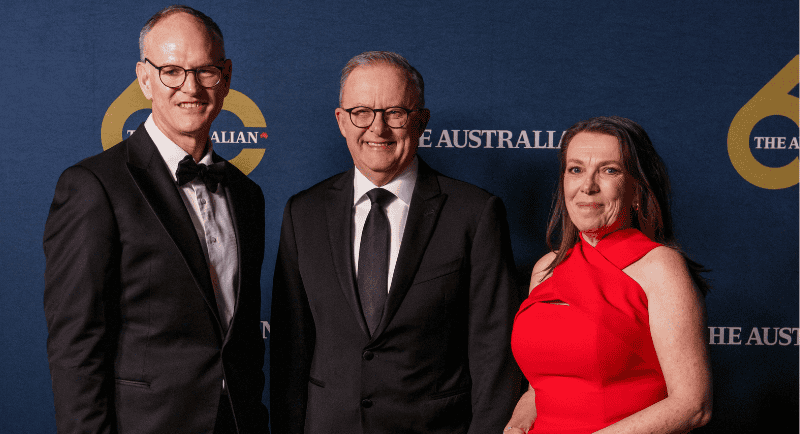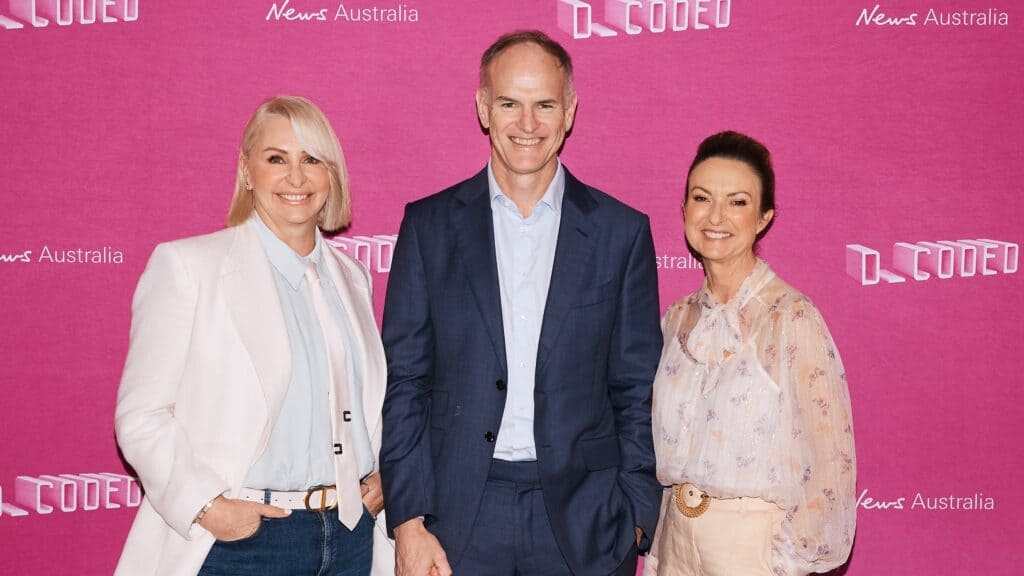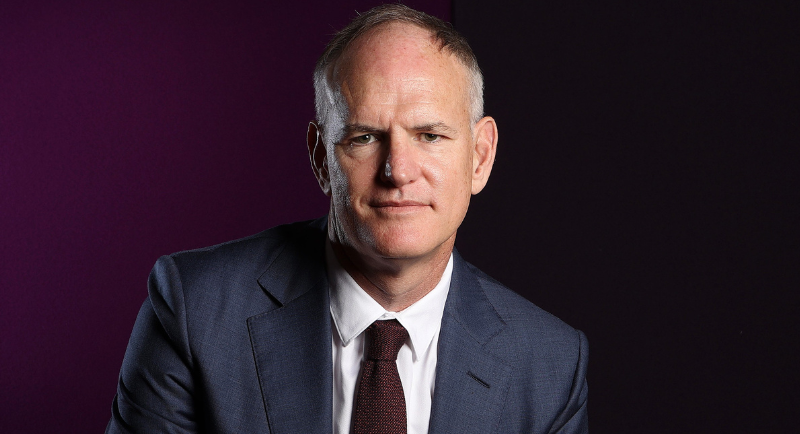In the past three years, News Corp’s executive chairman Australia, Michael Miller, has featured in the top 10 of the Mediaweek 100 list. For the 2024 list, he has edged his way higher to occupy the top spot.
Arguably, he could have received that recognition two years ago when he noted that News Corp Australia had its best year in a decade.
He has been placed at the top this year though for steering the giant publisher through a tougher market. When the economy goes south, News Corp Australia feels it all over. In Australia, the company has deep tentacles into the news business via investments in print, digital and broadcast.
The company was an early adopter in digital and news.com.au has been a leader in the commercial online space almost since inception. At a time when others are experimenting with paywalls, news.com.au has steadfastly kept the site free to view.
When News Corp decided to get into audio, it did so with a growing range of podcasts. Leading the way was the incredible success Hedley Thomas had first with The Teacher’s Pet. Now he is doing it again with the Bronwyn series.
The print titles initially offered free access to their digital versions. They all now sit behind paywalls and they have a combined subscription audience of 1m.
Miller was not able to attend the Mediaweek 100 Lunch, and he sent the managing director & publisher, The Australian and prestige titles, Nicholas Gray, to accept the award on behalf of the company.
Before he left Australia on his recent trip, Miller spoke to Mediaweek.
See the complete list: MEDIAWEEK 100 – 2024
Current business climate
Our discussion started around the business climate in 2024. “It’s been a tougher year for the country,” stated Michael Miller. “It’s not just interest rates that are on hold. It feels like Australia is on hold. People face cost pressures and aren’t spending like they were. As a result, companies have been more constrained and that has impacted all in the media.”
When asked about what Miller and his teams are forecasting in terms of 2025, he explained: “We are going to have to work our way through uncertainty around the economy. It will be an election year too which outs some people on pause. We expect the first half to be challenging, but we are hopeful the second half sees some normalisation.”
News Corp Australia restructure
Mediaweek reported on a number of organisational changes within the Australian business in recent times. “I would say that every major company this year has restructured,” said Miller. “Some are still going through that. You’re seeing what’s happening at Seven and Nine in terms of their news divisions.
“We’ve seen changes in the sales leadership at Seven and their structures changed. Southern Cross has gone through its own evolution.
“The industry has gone through a lot of change and we’ve probably made bigger changes because we better planned it than others.
“Unfortunately, those plans became a bit more public than we would have liked. But to get it right, sometimes you’ve got to engage with groups of people.”
A major concern when any media group cuts staff is the impact it could have on the product. How has News Corp gone in that regard?
“Others have commented on this, that there’s been less impact on frontline journalists. We’re doing far better at sharing our journalism around the group.”
He added investing in the product remains a priority. “If I was able to get any extra dollars, I would put them into better journalism.”
Keeping the news brands fresh can be difficult with shrinking teams. Yet Miller said they have plenty up their sleeves for 2025. “We do, but we probably won’t flag them with you just yet, sorry.”
“This week we launched health as an example on The Australian. You’re seeing a lot more video journalism. Things like ‘Charlotte’s Wish’ around the network his month.
“If you look at what happened in Queensland, Voter Verdict [in The Courier-Mail] was a new way of reality TV on elections. The 5 @ 5 on The Daily Telegraph has done remarkably well. So they’re examples of the areas we’re leaning into.”

Michael Miller with Prime Minister Anthony Albanese and editor-in-chief of The Australian Michelle Gunn at the newspaper’s 60th anniversary
News Corp Australia leadership
Miller marks nine years in the role at News Corp Australia this year.
In 2015 there were a number of changes at the top of News Corp Australia. Julian Cark retired and his role of CEO was taken over by Peter Tonagh, formerly COO. Michael Miller, was CEO of APN, but rejoined the company as executive chairman of News Corp Australasia. Tonagh soon handed over his responsibilities to Miller when Tonagh was appointed Foxtel CEO.
Miller reports to News Corporation CEO Robert Thomson, head of the global operations.
Having a period of stable leadership at News seems to have been beneficial. “I compare ourselves to football teams – and we own a share of the Brisbane Broncos,” explained Miller. “When you’ve got consistency, you tend to play better.
“In both the player group and leadership group, back office, front office. News has shown that we perform consistently well through consistency of strategy and leadership. Whenever people change, they want to change things.
“That doesn’t always build upon what you’ve already got, those foundations. I’m lucky I work for a company that has that mantra and that is part of our DNA.”
As to media coverage about News Corp chairman Lachlan Murdoch spending more time in Australia these days, Miller commented: “I would say he’s been spending more time in Australia now for many years. It’s no different now to how it was four or five years ago. He spends a lot of time travelling as well.
“We know that all the Murdochs are very passionate about news media and are great supporters of journalism.”
There’s been a good supply of Australians to head office too in New York. That has been highlighted by the recent decision of group CFO Susan Panuccio to step away. Miller reminded Mediaweek there are a few others still there in addition to Robert Thomson – Damian Eales (now the CEO of Realtor.com) and Ruth Allen (chief human resources officer).
“It’s good to have Aussie accents in the head office,” grinned Miller.
Taking on big tech
Both Miller and Thomson have spoken about the dangers of big tech on both the industry and consumers, young and old.
Miller called out The Sydney Morning Herald for what he said was its good work in the investigation it titled The 101 ways Google serves up Australians to known scammers.
“One of the things that does trend is scams. Australians are waking up every morning to another hoax or fake message.
“We are also very concerned about youth suicide. And also the broader impacts on all businesses. With search and social now, if you’re not on it and you’re not prominently on it and not paying to be prominent on it, it’s hard to have a business. Is that right in terms of a functioning competitive market?
“I’d argue no, and I think that’s where our government’s starting to show some movement. There’s been a policy launch every week now, and I suspect there’s a few more in the coming few weeks.”

Michael Miller with News Corp’s Lou Barrett and Pippa Leary
Competitive media landscape
Miller might have complimented Nine on their recent Google investigation, but they remain fierce competitors. Nine recently fired a broadside at News Corp when they labelled a campaign a “vendetta” to oust Kevin Rudd as US ambassador. An editorial in The SMH called the campaign a “disgrace”.
Miller wasn’t about to join the fray. “I’d say as an industry, we’re working really well. We print and distribute for Nine, for example.
“Our competition is probably not each other any more.
“We’re seeing that [our competition] is the tech platforms. We’re aligned on the importance of trusted media.
“As an industry, we are probably far closer than what many would consider. We might have different audiences and different stories to run. I understand that if they have a different opinion, they should be able to write that.
“I have lived with that sort of niggle for a good 40 years, and I’m not going to start worrying about it now.”
Still a place for print?
News Corp and Nine Entertainment Co are still heavily in the print business seven days a week. When asked if News Corp runs the numbers on the print model about not publishing every paper, every day, Miller replied: “I do run the numbers and they’re still profitable.
“I’ll continue to run the numbers. When it gets to a point where it becomes evident they’re not profitable [we will reconsider]. There are close to a million papers consumed every day in Australia on the weekends. Most categories would be pretty happy with that sort of day-to-day penetration.”
The ad loads in those products indicate marketers still find many of the products as a useful way to reach an audience.
“All traditional mass media, and TV particularly, even radio through streaming, have been disrupted. For some categories, print is still reaching a pretty defined audience, being older, wealthy Australians.”
Keeping the product daily is key to maintaining that audience.
“It’s a bit like TV programming. It’s about habit, regular scheduling. Some people are in the habit of reading the printed product every day. You change it and you put that at risk. While there are some days that people are more likely, like the weekends, to consume, they’re still consuming in those large numbers, Monday to Friday, and we’ll still continue to serve that need.”
See also: Michael Miller on News Corp revenues, growth targets and growing client solutions
